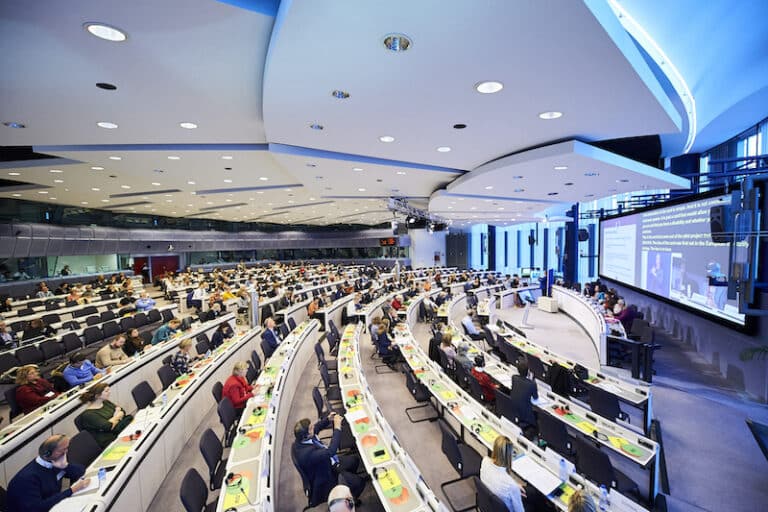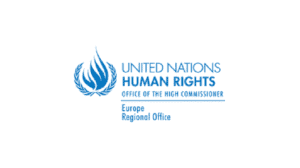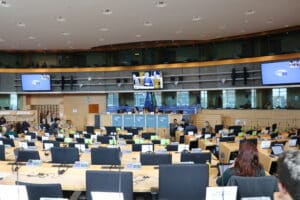On the 3rd and the 4th of December EUD Board Members Sofia Isari and Louise ‘Lolo’ Danielsson and EUD staff participated at the European Day of Persons with Disabilities (EDPD) conference, which took place in Brussels and was organised by the European Commission and the European Disability Forum.
During the first day of the EDPD conference the next European Disability Strategy (EDS) for the period of 2020 – 2030 and its implementation were discussed. It was highlighted that EU’s next Multiannual Financial Framework (MFF) 2021 – 2027 will play a huge role in implementing new EDS.
Member of the European Parliament (MEP) Helga Stevens presented European Parliament’s report on the implementation of the European Disability Strategy 2010 – 2020. The report lists the recommendations for a comprehensive and effective 2020 – 2030 Disability Strategy. MEP Stevens emphasised that it is essential for the new European Disability Strategy to ensure full implementation of the UN CRPD in all areas of EU policy by mainstreaming accessibility, participation, non-discrimination and equality. Moreover, it is essential to allocate adequate budget, adopt clear timeframe for implementation and to establish monitoring mechanism. MEP Stevens highlighted that the consultation process during the period of drafting the new strategy should be transparent, understandable and fully accessible. Emmanuelle Grange, Head of the Disability and Inclusion Unit, at the Directorate-General for Employment, Social Affairs and Inclusion (DG EMPL), European Commission, highlighted that the new European Disability Strategy can only be a success if all stakeholders, including civil society, are involved while designing the new strategy. Mrs Grange encouraged all stakeholders to participate and collaborate together with the European Commission during the period of drafting the new Disability Strategy 2020 – 2030.
During the second panel presenters and participants discussed how will the next Multiannual Financial Framework contribute to the implementation of the European Disability Strategy 2020 – 2030. During the panel new proposals, the European Social Fund, the European Regional Development Fund and Rights and Values programme were presented as tools for future implementation of EDS 2020 – 2030. Andriana Sukova, Deputy Director-General at DG EMPL, European Commission highlighted that the new proposal for ESF+ aims at promoting the inclusion in the society of persons with disabilities on an equal basis with others and aims at contributing to the implementation of the UN CRPD. At least 25% of investments under ESF+ will target social inclusion, with specific actions for people at risk of discrimination, including boosting labour market participation of people with disabilities, enhancing inclusion and reducing inequalities. It was concluded that the next EU budget should be a tool to implement rights and principles of UN CRPD and should not support actions which are in conflict with it.
As 2018 is the European Year of Cultural Heritage, the second day of EDPD conference participants discussed the importance of ensuring accessibility for cultural heritage in Europe. During the panel Louvre museum in Paris, France was presented as a good practice example how culture heritage can be made accessible to all. EUD Board Member Louise ‘Lolo’ Danielsson took an opportunity and reminded the panellists that while ensuring accessibility for cultural heritage it is essential to ensure that all perspectives to accessibility, including the deaf perspective, are taken into account. It was added that technology can play a huge rule while ensuring that information is available in sign language(s) for deaf persons.
The EDPD conference was concluded with an Access City Award ceremony. Ms Marianne Thyssen, Commissioner for Employment, Social Affairs, Skills and Labour Mobility handed out the three traditional awards to the most accessible European cities. The third place was awarded to Gdynia, Poland, the second place was awarded to Evreux, France and the first place was awarded to Breda, the Netherlands. Breda’s commitment to accessibility, its inclusive philosophy, constant engagement with people with disabilities and continuous improvement is commendable and is the perfect example how to ensure accessibility to all.













